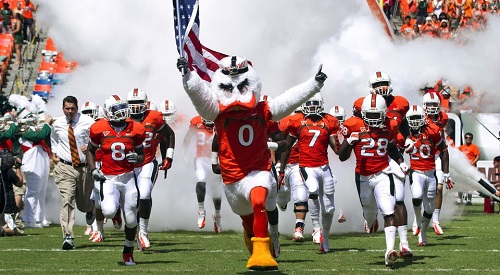
NCAA: Through Scandal and Incompetence
An all-powerful body polices college sports. That body makes up and enforces rules at it’s own convenience. That body often refuses to accept that changing times require changing bylaws. That body holds itself to a completely different, lower standard than the young adults it profits from. Increasingly, that body operates as though it was devoid of a head, with limbs operating according to their own devices without central oversight.
It’s time someone put that body out to pasture.
The utter incompetence in the handling of the Nevin Shapiro case at the University of Miami has shone a very public light on the bungling of the NCAA, an organization that many have been increasingly critical of in recent years, to put it lightly.
The past year has shone an increasingly critical eye on the NCAA, and the mismanagement of a number of high-profile cases has painted a perhaps fair picture in the public consciousness of the NCAA as a collection of power-mad obsessives with a skewed sense of their own importance.
Shabazz Muhammad, star basketball player for the UCLA Bruins, was ruled ineligible at the start of the season because a NCAA investigator decided he was guilty of infractions well before key facts in the case had been gathered. Muhammad has since been reinstated and the investigator has been fired.
Perhaps the biggest blunder, the one providing the most egg on the face of NCAA president Mark Emmert and his organization, is still unfolding in regards to University of Miami booster Nevin Shapiro. The missteps the NCAA took in the case are massive, embarrassing, and may be enough to finally force change upon the archaic institution.
Even a stripped down version of the Shapiro story displays the gall with which the NCAA now operates.
Shapiro was a Miami booster, providing cash, goods, and more for Hurricane athletes. In an eight-year stretch he showed no interest in obeying regulations set down by the NCAA. After going to jail in 2010 for running a lucrative Ponzi Scheme, Shapiro admitted to spending millions on Miami athletes, promising to reveal all misdeeds he took part in. Understandably, the NCAA began investigating Shapiro’s claims.
The university took action of its own, ruling players ineligible, banning itself from postseason play for two years, and voluntarily forfeiting scholarships. In the midst of that, the investigation continued.
One of Shapiro’s ongoing legal concerns is a bankruptcy case, which carries certain legal and judicial ramifications and powers. The NCAA lacks all of those powers.
Yet the NCAA found out that Shapiro’s attorney, Maria Elena Perez, would be willing to question witnesses in the bankruptcy case about items relevant the NCAA’s investigation of Miami. Despite the advice of their legal team, the NCAA jumped at the chance to question otherwise uncooperative witnesses or get answers to questions that were being otherwise withheld from them. For her part, Perez made a pretty penny billing the NCAA, while her client felt his pockets get a bit heavier as well.
Once the payouts became public knowledge, no one was safe as the NCAA scrambled to cover their backsides from the fallout. At least two former NCAA staffers were fired as a direct result of the payouts, and it would be no surprise if more were forthcoming.
Despite all that smoke, the NCAA claims there is no fire. On Monday Emmert announced that while their had been “missteps” in the investigation, no laws or bylaws had been broken and the investigation will go on with properly attained evidence. It is a bold move from the NCAA in a situation where many believe the best course of action is to shut down the investigation and cut losses.
Indeed, Miami President Donna Shalala issued a statement to that effect following the NCAA’s announcement. It read in part:
“In September 2010 -two and a half years ago -the University of Miami advised the NCAA of allegations made by a convicted felon against former players and, at that time, we pledged our full cooperation with any investigation into the matter. One year later, in August 2011, when the NCAA’s investigation into alleged rules violations was made public, I pledged we would ‘vigorously pursue the truth, wherever that path may lead’ and insisted upon ‘complete, honest, and transparent cooperation with the NCAA from our staff and students.’
The University of Miami has lived up to those promises, but sadly the NCAA has not lived up to their own core principles. The lengthy and already flawed investigation has demonstrated a disappointing pattern of unprofessional and unethical behavior. By the NCAA leadership’s own admission, the University of Miami has suffered from inappropriate practices by NCAA staff. There have also been damaging leaks to the media of unproven charges. Regardless of where blame lies internally with the NCAA, even one individual, one act, one instance of malfeasance both taints the entire process and breaches the public’s trust.”
Shalala’s reasoning is sound, and her indignation is justified. The NCAA is an organization that deigns to uphold the amateur ideals and fairness of collegiate athletics, yet it refuses to admit obvious wrongdoing. The NCAA is continuing with the Miami charade in what is looking more and more like a sad attempt to remain relevant and justify the massive revenue they make on the backs of unpaid student-athletes (a term the NCAA coined in the middle of the last century to avoid paying out worker’s compensation claims to injured athletes).
The Muhammad and Miami cases are yet two more sad chapters in the NCAA’s continued money-fueled march into irrelevance. Thankfully they are chapters that many are reading, and hopefully they speed up the march.
[php snippet=1]

